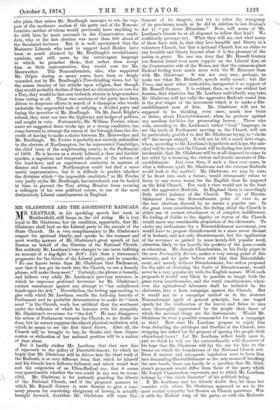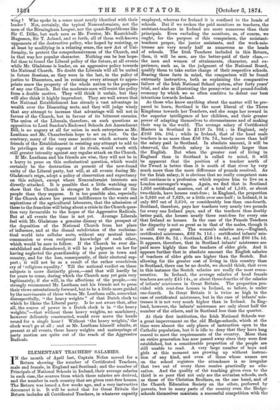MR. GLADSTONE AND THE AGGRESSIVE RADICALS.
TR. 17FIA TRAM, in his sparkling speech last week at M. Huddersfield, still harps on the old string. He is very loyal to Mr. Gladstone, but 'on condition, apparently, that Mr. Gladstone shall lead on the Liberal party to the assault of the State Church. He is very complimentary to Mr. Gladstone's respect for spiritual liberty, and speaks in the warmest and most worthy manner of Mr. Gladstone's great speech of last Session on behalf of the liberties of the National Church. But suddenly Mr. Leatham's tone changes to one more befitting an account of a dog-fight in Bell's Life than a statesman's prognostic for the future of the Liberal party, and he remarks, " No one knows better than Mr. Gladstone that Parliament, now that it has got its teeth into the Church, to use a homely phrase, will make them meet." Certainly, the phrase is homely, and follows very oddly Mr. Leatham's previous sentence, in which he expresses profound reverence for Mr. Gladstone's earnest resentment against any attempt to "lay unhallowed hands upon the Ark." Nevertheless, the feeling approaching to glee with which Mr. Leatham recalls the bull-dog ferocity of Parliament and its probable determination to make its "teeth meet " in the Church, reads less artificial than the sentiment under the influence of which he honours with his sympathy Mr. Gladstone's reverence for " the Ark." He may disapprove the action of Parliament towards the Church, as no doubt he does, but he cannot suppress the almost physical exultation with which he seems to see the first blood drawn. After all, the Church will be brought to bay, he thinks, and then dispos- session or abdication of her national position will be a matter of time alone.
But it hardly strikes Mr. Leatham that that new line of approach to the policy of Disestablishment, by which he hopes that Mr. Gladstone will be driven into the front rank of the Radicals, is so very different from that which he himself and his friends have hitherto followed, and which would best suit the exigencies of an Ultra-Radical cry, that it seems very questionable whether the two could in any way be recon- ciled. Mr. Gladstone is for jealously guarding the liberty of the National Church, and if the proposed measure by which Mr. Russell Gurney is next Session to give a sum- mary process for convicting clergymen of heresy, is actually brought forward, doubtless Mr. Gladstone will warn Par- 1 liament of its dan s ahned dtiyinto relax the stringency provisions, muegheme Leatham's 's tiute dsownbe aRitualism." of its Norewlation to last Session's disposed toto follow thatalleyadolf We. say, and liberty many of thempresume nott.allWh have said, that they loveybreadtsah has nbeelrty in a and liberty that a national Church h I voluntmary any breadth an beyond what it is the pleasureeoliGaimof the nation to grant. No Yone can deny that Mr. Russell Gurney last Session found even more support on the Liberal than on the Conservative side of the House, nor that the common-place Radical feeling went much more with Sir W. Harcourt than with Mr. Gladstone. It was not very easy, perhaps, to make out what Mr. Richard's speech really meant ; but the Times, and most other authorities, interpreted it as support of Mr. Russell Gurney. It is evident, then, as it was evident last Session, that whatever line Mr. Leatham individually may take, Mr. Gladstone will not rally the aggressive Radicals round him in the first stages of the movement which is to make a Dis- establishment man of him. Mr. Gladstone will not be supposed to be thinking even once, much less twice or thrice, about' Disestablishment, when he protests against any needless facilities for prosecuting heresy. Those who wish, according to Mr. Leatham's rather " loud " language, to see the teeth of Parliament meeting in the Church, will not be particularly gratified to find Mr. Gladstone trying to " choke off " the savage animal. It will not be till a much later stage, when, according to Mr. Leatham's hypothesis and hope, the mis- chief will be done, and the Church will be finding her new slavery intolerable, that Mr. Gladstone will be at all disposed to come to her relief by welcoming the violent and drastic measure of Dis- establishment. And even then, if such a time ever came, in what a different spirit Mr. Gladstone and the extreme Radicals would look at the matter l Mr. Gladstone, we may be sure, if he lived into such a future, would strenuously refuse to listen to any worse terms for the English than he imposed on the Irish Church. But such a view would not in the least suit the aggressive Radicals. In England there is exceedingly little active jealousy of the Church. The cry of Disesta- blishment from the Nonconformist point of view is, as the last elections showed, by no means a popular one. In the great town constituencies, the feeling about the Church is either one of earnest attachment or of complete indifference. No feeling of dislike to the dignity or status of the Church would move any considerable proportion of the electorate. To excite any enthusiasm for a Disestablishment movement, you would have to propose disendowment in a sense never dreamt of in Ireland, and not only disendowment, but the application of the revenues so gained to some keenly-felt popular need, otherwise likely to tax heavily the pockets of the poor,—such as education. Mr. Joseph Chamberlain, in his lively paper in the new Fortnightly Review, makes a very strong point of this necessity, and we quite believe with him that Disestablish- ment, not merely without Disendowment, but unless proposed for the sake of obtaining the fruits of Disendowment, would never be a very popular cry with the English masses. With such proposals it would very likely be possible to tempt both the great town constituencies, and the rural constituencies, when- ever the agricultural labourers shall be included in the electorate, into a keen campaign against the Church. But it would not be a campaign carried on in the abstract Nonconformist spirit of general principle, but one waged openly for the confiscation of the loaves and fishes to uses more thoroughly appreciated by the people than those of which the national clergy are the instruments. Would Mr. Gladstone be even a possible commander for such a campaign as this ? How does Mr. Leatham propose to cajole him from defending the privileges and liberties of the Church, into stripping her naked for the purpose of sparing the people their
educational taxes ? Let Mr. Leatham reflect fairly upon it, and we think he will see the extraordinarily wild character of his hope that Mr. Gladstone will lay the axe for him to the beams on which the foundations of the National Church rest. Even if narrow and retrograde legislation were to force him into demanding Disestablishment as the only means of breaking the new bonds, there can hardly be a question that Mr. Glad- stone's proposals would differ from those of the party which Mr. Joseph Chamberlain represents, and to which Mr. Leatham belongs by "the whole diameter" of his political being. If Mr. Leatham and his friends doubt this, let them but consider with whom Mr. Gladstone appeared to act in the most cordial sympathy last Session on Church questions. Was it with the Radical wing of the party, or with the Moderate *mg ? Who spoke in a sense most nearly identical with their leader I Not, certainly, the typical Nonconformists, not the men of the Birmingham League, nor the quasi-Republicans like Sir C. Dilke, but such men as Mr. Forster, Mr. Knatchbull- Hugessen, Sir T. Acland, and so forth, all of them well-known opponents of the destructive policy, who hoped by resisting, or at least by modifying in a relaxing sense, the new Act of 'Uni- formity, to protect the comprehensiveness of the Church, and in that way her popular character. Nothing can be less hope- ful than to found the Liberal policy of the future, at all events while Mr. Gladstone is leader, on an aggressive policy towards the National Church. No doubt the Liberals will all be united in future Sessions, as they were in the last, in the policy of justice to Dissenters, and in resisting every attempt to appro- priate anew the property of the whole nation to the purposes of any one Church. But the moderate men will resist the policy from a double motive. They will think it unfair, but they will also think it highly imprudent. They are well aware that the National Establishment has already a vast advantage in wealth over the Dissenting sects, and they will judge wisely that any attempt to increase that advantage will tell not in favour of the Church, but in favour of its bitterest enemies. 'The union of the Liberals, therefore; on such questions as opposition to Lord Sandon's Endowed Schools Act Amendment Bill, is no augury at all for union in such enterprises as Mr. Leatham and Mr. Chamberlain hope to set on foot. On the -contrary, many of the very same motives which actuate the friends of the Establishment in resisting any attempt to add to its privileges at the expense of its rivals, would work with -still greater intensity against any regular attack on the Church.
If Mr. Leatham and his friends are wise, they will not be in a hurry to press on this ecclesiastical question, which would -certainly be the destruction at present of the new-found unity of the Liberal party, but will, at all events during Mr. Gladstone's reign, adopt a policy of observation and expectancy on this subject, except where Nonconformist interests are directly attacked. It is possible that a little watching may show that the Church is stronger in the affections of the people than they suppose. It is too possible also, especially if the Church shows her present indifference to the wants and aspirations of the agricultural labourers, that the admission of these to the franchise will bring about a crisis in the Church ques- tion very favourable to the hopes of the Aggressive Radicals. But at all events the time is not yet. Average Liberals feel with Mr. Gladstone a genuine dismay at the prospect of the deposition of the National Church from her place of influence, and at the dismal subdivision of the ecclesias- tical world into cellular sects, without any mutual inter- communion or even reciprocal knowledge of each other, which would be sure to follow. If the Church be ever dis- established and disendowed, it will be a judgment on her for having neglected the guardianship of the poor in town and country, and for the loss, consequently, of their electoral sup- port ; it will not be as a result of the rather overdriven cry of 'religious equality.' Till the national verdict on these subjects is more distinctly given,—and that will hardly be for years to come, during which the Church may yet gain very legitimately, if she will, in the affections of the people,—we strongly recommend Mr. Leatham and his friends not to press their views ostentatiously forward, but to be a little more guided by the movements of those whom Mr. Leatham calls, somewhat disrespectfully, " the heavy weights " of that Dutch clock
to-
which he likens the Liberal party. Is he not aware that, after all, the source of power in a Dutch clock is in " the heavy weights,"—that without those heavy weights, no machinery, however delicately constructed, would ever move the hands round for a single hour ? Without 'the heavy weights,' the -clock won't go at all ; and as Mr. Leatham himself admits, at present at all events, those heavy weights and mainsprings of party motion are quite out of the reach of the Aggressive Radicals.



































 Previous page
Previous page